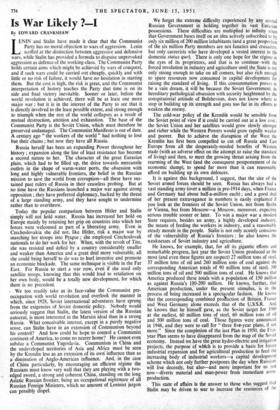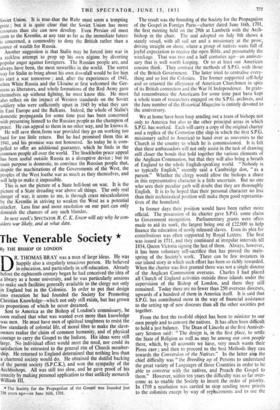Is War Likely ?—I
By EDWARD CRANKSHAW
LENIN and Stalin have made it clear that the Communist Party has no moral objection to wars of aggression. Lenin scoffed at the distinction between aggressive and defensive wars, while Stalin has provided a formula to disguise unprovoked aggression as defence of the working-class. The Communist Party holds certain aims which might be achieved by wars of conquest, and if such wars could be carried out cheaply, quickly and with little or no risk of failure, it would have no hesitation in starting them. But the cost is high, the risk is great, and the Communist interpretation of history teaches the Party that time is on its side and final victory inevitable. Sooner or later, before the world revolution is achieved, there will be at least one more major war ; but it is in the interest of the Party to see that it is directly involved to the least possible extent, and strong enough to triumph when the rest of the world collapses as a result of mutual destruction, attrition and exhaustion. The base of the Communist Party is the Soviet Union. which must therefore be preserved undamaged. The Communist Manifesto is out of date. A century ago " the workers of the world " had nothing to lose but their chains ; but now they have all Russia.
Russia herself has been an expanding Power throughout her history ; expansion along the line of least resistance has become a second nature to her. The character of the great Eurasian plain, which had to be filled up, the drive towards mercantile outlets in the shape of warm-water ports, the • obsession with long and highly vulnerable frontiers, the belief in the Russian mission to save the world from corruption—all these have sus- tained past rulers of Russia in their ceaseless probing. But at no time have the Russians launched a major war against strong opposition ; they have preferred diplomacy, backed by the threat of a large standing army, and they have sought to undermine rather than to overthrow.
Today the popular comparison between Hitler and Stalin simply will not hold water. Russia has increased her hold on Europe mainly by retaining her grip on countries into which her forces were welcomed as part of a liberating army. Even in Czechoslovakia she did not, like Hitler, risk a major war by marching her troops into Prague ; she employed Czechoslovak nationals to do her work for her. When, with the revolt of Tito, she was resisted and defied by a country considerably smaller and weaker than America and a great deal more vulnerable, all she could bring herself to do was to hurl invective and promote an economic blockade. The same technique is visible in the Far East. For Russia to start a war now, even if she used only satellite troops, knowing that this would lead to retaliation on her own body, would be a totally new development, for which there is no precedent.
We too readily take at its face-value the Communist pre- occupation with world revolution and overlook the manner in which, since 1928, Soviet international adventures have sprung from the exigencies of Soviet domestic policy. Nobody would seriously suggest that Stalin, the latest version of the Russian autocrat, is more interested in the Marxist ideal than in a strong Russia. - What conceivable interest, except in a purely negative sense, can Stalin have in an extension of Communism beyond his control? And how could he hope to control a Communist continent of America, to come no nearer home? He cannot even subdue a Communist Yugoslavia. Communism in China and the undeveloped territories of Asia and Africa must be seen by the Kremlin less as an extension of its own influence than as a diminution of Anglo-American influence. And, in the case of China particularly, by encouraging an efficient regime the Russians must know very well that they are playing with a two- edged sword, a strong and coherent China, standing on the long Asiatic Russian frontier, being an occupational nightmare of all Russian Foreign Ministers, which no amount of Leninist jargon can possibly dispel. We forget the extreme difficulty experienced by any central Russian Government in holding together its vast Eurasian possessions. These difficulties are multiplied to infinity when that Government bases itself on an idea actively subscribed to by only six million of 200 million inhabitants (and a great proportion of the six million Party members are not fanatics and crusaders, but only careerists who have developed a vested interest in the domestic status quo). There is only one hope for the regime in the eyes of its proprietors, and that is to continue • with the forced revolution in industry and agriculture until; the State is not only strong enough to take on all comers, but also rich enough to spare resources now consumed in capital development for raising the standard of living. If this consummation proves to be a vain dream, it will be because the Soviet Government, its hereditary pathological obsession with security heightened by the conspiratorial attitude of Bolshevism, does not know where to stop in building up its strength and goes too far in its efforts to weaken the enemy.
The cold-war policy of the Kremlih would be sensible from the Soviet point of view if it could be carried out at a low cost ; the Soviet Union and her satellites would grow slowly stronger and richer while the Western Powers would grow rapidly weaker and poorer. But to achieve the disruption of the West the Kremlin has first been compelled to cut off Russia and East Europe from all the desperately-needed benefits of Western trade (with an adverse effect on the attempt to raise the standard of living) and then, to meet the growing threat arising from the rearming of the West (and the consequent postpone,ment of the economic slump), to spend far more than it can reasonably afford on building up its own defences.
It is against this background, I suggest, that the size of the Soviet armed forces should be seen. Russia has always had a vast standing army (over a million in pre-1914 days, when France and Germany had about half-a-million each) ; and .a good deal of her present extravagance in numbers is easily explained if you look at the frontiers of the Soviet Union. not from Berlin or Vienna, but from Moscow—a Moscow, moreover, expecting serious trouble sooner or later. To win a major war a modern State requires, besides an army, a highly developed industry, the means of feeding the workers in industry, and a reasonably steady morale in the people. Stalin is not only acutely conscious of the vulnerability of Russia's frontiers ; he also knows the weaknesses of Soviet industry and agriculture.
He knows, for example, that, for all its gigantic efforts and remarkable progress, last year the Soviet Union produced at the most (and even these figures are suspect) 27 million tons of steel, 37 million tons of oil and 260 million tons of coal against the corresponding American totals of 90 million tons of steel, 300 million tons of oil and 500 million tons of coal. He knows that America produced these totals with a population of 150 million as against Russia's 190-200 million. He knows, further, that American production.' under the present stimulus, is in the process of being increased in a spectacular fashion. He knows that the corresponding combined production of Britain, France and West Germany alone exceeds that of the U.S.S.R. And he knows that he himself gave, as the Soviet target for 1960 at the earliest, 60 million tons of steel, 60 million tons of oil and 500 million tons of coal. Those figures were announced in 1946, and they were to call for " three five-year plans, if not more." Since the completion of the last Plan in 1950, the Fi‘e- year Plan seems to have disappeared from the map of the Smict economy. Instead we have the great hydro-electric and irrigation projects, the purpose of which is to provide a basis for future Industrial expansion and for agricultural production to feed the increasing body of industrial workers—a capital development scheme which not only further postpones the day when Russians will live decently, but also—and more important for us just now—diverts material and man-power from immediate arms- production. This state of affairs is the answer to those who suggest that Stalin may be driven to war to increase the resources of the , Soviet Union. It is true-that the Ruhr must seem a tempting prize ; but it is quite clear that the Soviet. Union has more resources than she can now develop. Even Persian oil must seem to the Kremlin, at any rate as far as the immediate future is concerned, a commodity to deny the British rather than a source of wealth for Russia.
Another suggestion is that Stalin may be forced into war in a reckless attempt to prop up his own regime by diverting popular anger against foreigners. The Russian people are, and always have been, the most unwarlike in the world. The surest way for Stalin to bring about his own downfall would be for him. to start a war tomorrow and, after the experiences of 1941. when White Russia and the Ukraine at first welcomed the Ger- mans as liberators, and whole formations of the Red Army gave themselves up without fighting, he must know this. He must also reflect on the impact of Western standards on the Soviet soldiery who were sufficiently upset in 1945 by what they saw in East Europe and the Balkans. Indeed, the whole of Stalin's domestic propaganda for some time past has been concerned with presenting himself to the Russian people as the champion of peace. He can appeal to them in no other way, and be knows it. He will save themirom war provided they go on working too hard for too little return. But he -had promised them this in 1941. and his promise was not honoured. So today he is com- pelled to offer an additional guarantee, which he finds in the common people all over the world. The Stockholm peace appeal has been useful outside Russia as a disruptive device ; but its main purpose is domestic, to convince the Russian people that, despite the machinations of the Governments of the West, the peoples of the West loathe war as much as they themselves, and will help to make it impossible. This is not the picture of a State hell-bent on war. It is the picture of a State dreading war above all things. The only real danger of war, it seems to me, is through crass miscalculation by the. Kremlin in striving to weaken the West as a potential attacker. Less fear and more resolution on our part.can only diminish the chances of any such blunder.
In next week's SPECTATOR R. C. K. Ensor will say why he con- siders war likely, and at what date.



































 Previous page
Previous page